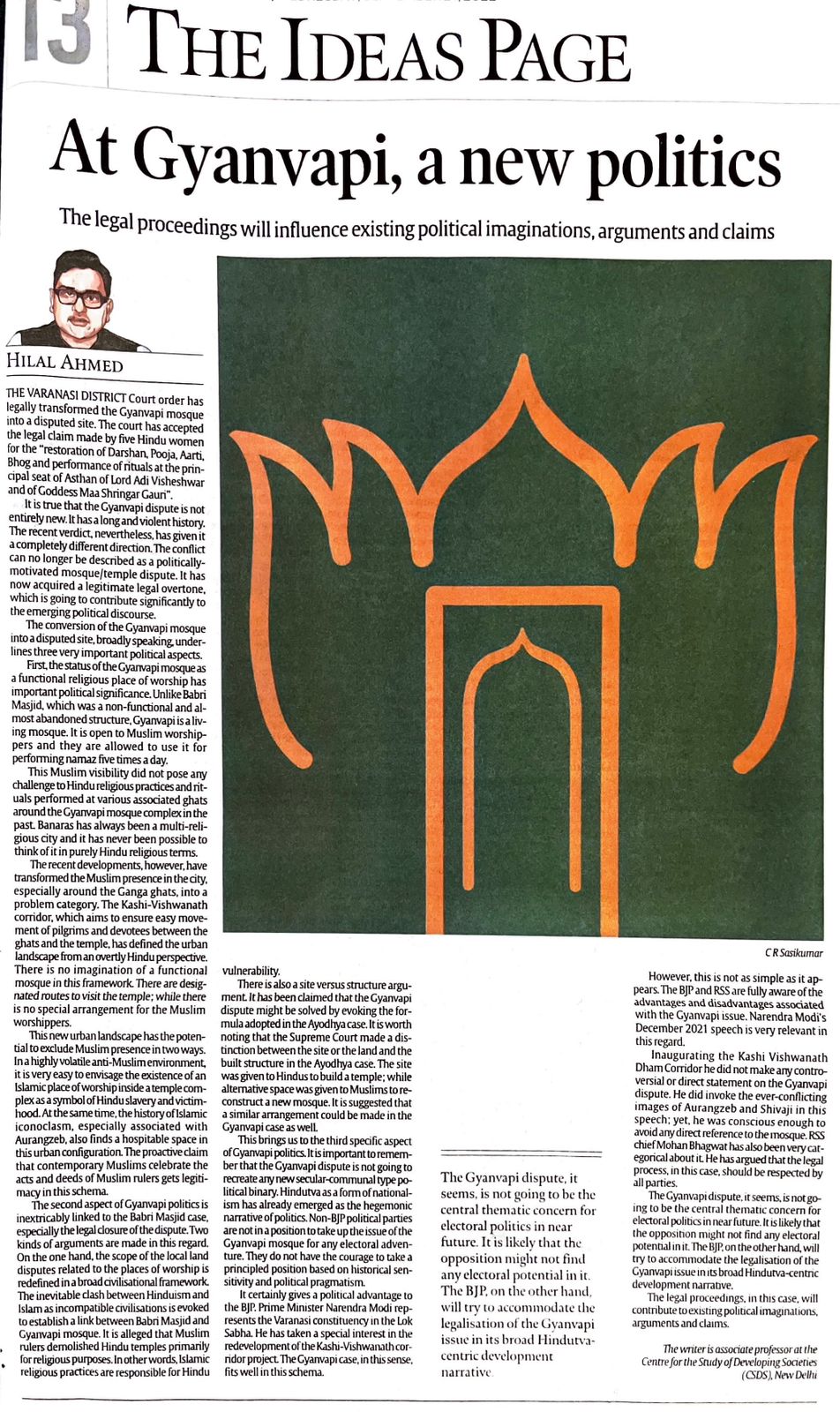At Gyanvapi, the law feeds into BJP’s political imagination
Hilal Ahmed writes: It is important to remember that the Gyanvapi dispute is not going to recreate any new secular-communal type political binary. It will be accommodated as a part of the ruling party's ongoing narrative.
Written by Hilal Ahmed
Updated: September 21, 2022
The Varanasi District Court order has legally transformed the Gyanvapi mosque into a disputed site. The court has accepted the legal claim made by five Hindu women for the “restoration of Darshan, Pooja, Aarti, Bhog and performance of rituals at the principal seat of Asthan of Lord Adi Visheshwar and of Goddess Maa Shringar Gauri”.
It is true that the Gyanvapi dispute is not entirely new. It has a long and violent history. The recent verdict, nevertheless, has given it a completely different direction. The conflict can no longer be described as a politically-motivated mosque/temple dispute. It has now acquired a legitimate legal overtone, which is going to contribute significantly to the emerging political discourse.
The conversion of the Gyanvapi mosque into a disputed site, broadly speaking, underlines three very important political aspects.
First, the status of the Gyanvapi mosque as a functional religious place of worship has important political significance. Unlike Babri Masjid, which was a non-functional and almost abandoned structure, Gyanvapi is a living mosque. It is open to Muslim worshippers and they are allowed to use it for performing namaz five times a day.
This Muslim visibility did not pose any challenge to Hindu religious practices and rituals performed at various associated ghats around the Gyanvapi mosque complex in the past. Banaras has always been a multi-religious city and it has never been possible to think of it in purely Hindu religious terms.
The recent developments, however, have transformed the Muslim presence in the city, especially around the Ganga ghats, into a problem category. The Kashi-Vishwanath corridor, which aims to ensure easy movement of pilgrims and devotees between the ghats and the temple, has defined the urban landscape from an overtly Hindu perspective. There is no imagination of a functional mosque in this framework. There are designated routes to visit the temple; while there is no special arrangement for the Muslim worshippers.
This new urban landscape has the potential to exclude Muslim presence in two ways. In a highly volatile anti-Muslim environment, it is very easy to envisage the existence of an Islamic place of worship inside a temple complex as a symbol of Hindu slavery and victimhood. At the same time, the history of Islamic iconoclasm, especially associated with Aurangzeb, also finds a hospitable space in this urban configuration. The proactive claim that contemporary Muslims celebrate the acts and deeds of Muslim rulers gets legitimacy in this schema.
The second aspect of Gyanvapi politics is inextricably linked to the Babri Masjid case, especially the legal closure of the dispute. Two kinds of arguments are made in this regard. On the one hand, the scope of the local land disputes related to the places of worship is redefined in a broad civilisational framework. The inevitable clash between Hinduism and Islam as incompatible civilisations is evoked to establish a link between Babri Masjid and Gyanvapi mosque. It is alleged that Muslim rulers demolished Hindu temples primarily for religious purposes. In other words, Islamic religious practices are responsible for Hindu vulnerability.
There is also a site versus structure argument. It has been claimed that the Gyanvapi dispute might be solved by evoking the formula adopted in the Ayodhya case. It is worth noting that the Supreme Court made a distinction between the site or the land and the built structure in the Ayodhya case. The site was given to Hindus to build a temple; while alternative space was given to Muslims to reconstruct a new mosque. It is suggested that a similar arrangement could be made in the Gyanvapi case as well.
This brings us to the third specific aspect of Gyanvapi politics. It is important to remember that the Gyanvapi dispute is not going to recreate any new secular-communal type political binary. Hindutva as a form of nationalism has already emerged as the hegemonic narrative of politics. Non-BJP political parties are not in a position to take up the issue of the Gyanvapi mosque for any electoral adventure. They do not have the courage to take a principled position based on historical sensitivity and political pragmatism.
It certainly gives a political advantage to the BJP. Prime Minister Narendra Modi represents the Varanasi constituency in the Lok Sabha. He has taken a special interest in the redevelopment of the Kashi-Vishwanath corridor project. The Gyanvapi case, in this sense, fits well in this schema.
However, this is not as simple as it appears. The BJP and RSS are fully aware of the advantages and disadvantages associated with the Gyanvapi issue. Narendra Modi’s December 2021 speech is very relevant in this regard.
Inaugurating the Kashi Vishwanath Dham Corridor he did not make any controversial or direct statement on the Gyanvapi dispute. He did invoke the ever-conflicting images of Aurangzeb and Shivaji in this speech; yet, he was conscious enough to avoid any direct reference to the mosque. RSS chief Mohan Bhagwat has also been very categorical about it. He has argued that the legal process, in this case, should be respected by all parties.
The Gyanvapi dispute, it seems, is not going to be the central thematic concern for electoral politics in near future. It is likely that the opposition might not find any electoral potential in it. The BJP, on the other hand, will try to accommodate the legalisation of the Gyanvapi issue in its broad Hindutva-centric development narrative.
The legal proceedings, in this case, will contribute to existing political imaginations, arguments and claims.
The writer is associate professor at the Centre for the Study of Developing Societies (CSDS), New Delhi



